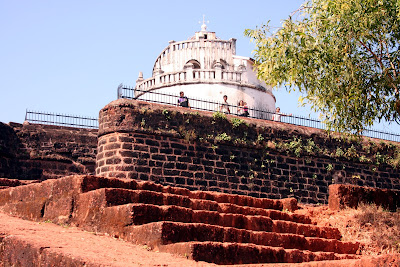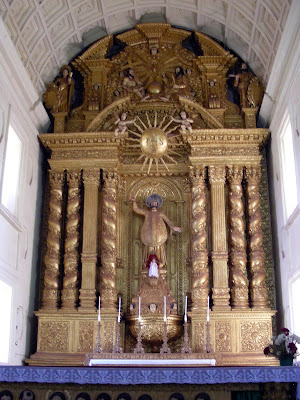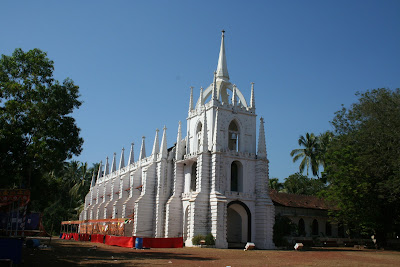Goa is best known for its numerous beaches featured in one of
my earlier travelogues [See: 55) Sun-drenched Goa with its beckoning beaches – Personal
Photo Album Part 16 (Aug 12)]. While focusing on seven of these beaches, I
had put off any reference to the other tourist attractions dotting the interior
landscape of Goa, reserving them for this sequel. In late November 2007 I had interspersed
visits to these places with the beach jaunts over a three day period planned in
advance by my resourceful local guide.
The
long Portuguese rule in Goa has left imprints of its distinctively European art
and culture that are visible principally in numerous churches, monuments,
buildings and other edifices for the visitors to see. A pictorial account of some of these is
presented here.
[As before, all pictures are in high resolution and can be blown up to
their full size by clicking on a picture and opening it in a separate window]
Fort Aguada
Roughly midway between Calangute
and Candolim beaches (see the map in
my earlier travelogue) are the well preserved Fort Aguada and its lighthouse
overlooking the Arabian Sea. It
comprises of a lower fort with bastions all around and an upper fort that
serves both as a vantage point and a watering station for ships. The word ‘aguada’ means ‘watering place’ in Portuguese
and fittingly the fort houses an enormous water tank. Its strategic location provided the
Portuguese a formidable defense against enemy attacks.
Here is a view of the fort with its towering lighthouse in
the background:
San Jacinto Church
On my way back from the visit to Fort Aguada and the two
beaches nearby (described in my previous write-up), I passed by the island of
San Jacinto and captured the following picture of its quaint old church against
some picturesque surroundings:
Basilica of Bom Jesus
Old Goa is the home for numerous historic churches belonging
to various congregations including the Basilica
of Bom Jesus which houses the relics of Saint Francis Xavier and is one of
the most revered places in the country for this reason. The following is a picture of the superbly
ornate exterior of this basilica, dating back to 1605. As a UNESCO World Heritage Site the facade of
this great church as well as its entire exterior deserves better maintenance.
The interior of the basilica contains breathtakingly
beautiful and elaborately gilded altars two of which are shown below:
The interior of the church is always thronged by visitors,
many of them unmindful of the appeals for maintenance of silence and decorum
inside. I noticed a harried church
official persistently exhorting the crowds to behave with dignity befitting the
solemn atmosphere.
Church of St Francis of
Assisi
The Church of St Francis of Assisi, forming part of a complex
of churches and located across the Basilica of Bom Jesus, is another UNESCO
World Heritage Site. The entire complex is
maintained by the Archaeological Survey of India whose sign board appears to be
almost as prominent as the church itself as seen in the following picture –
perhaps a case of blowing its own trumpet too loud.
Here is a close up view of the church showing its two majestic
octagonal towers pointing skyward and a rather out of place cannon in the
foreground.
The sprawling interior of the church features an
extraordinarily beautiful balcony as seen in the next picture. For me it was something straight out of
dreamland as I stood wide-eyed for a long time in contemplation of its sheer majesty
and grandeur.
Saligao Church
The Church of Mae de
Deus located about 13 km north of Panaji amidst picturesque surroundings in
the village of Saligao is an example of Gothic church architecture at its
best. Here is a picture of it against a
perfectly blue sky background:
A church in Panaji
In the heart of Panaji city is a beautiful church by the name
of ‘Our Lady of the Immaculate Conception’ with terraced steps leading up to
its entrance. Here are two pictures of
it side by side, one taken in daylight and another at night:
Mangeshi Temple
Shri Mangeshi Temple, a Hindu Konkani temple that has
undergone extensive renovation in recent times is located about 20 km away from
Panaji and its distinctively Indian architecture sets it apart from the
Portuguese architecture of the numerous churches in Goa. Here is a picture of the main temple:
In front of the temple is a seven-storey tall octagonal structure
symbolizing a lamp (deepa stambh).
It has a remote and perhaps unintended resemblance to the famous Tower
of Victory (Vijay Stambh) of
Chittoregarh in Rajasthan. Here is a
picture of it:
Safa Masjid
The Safa Masjid is
a prominent Islamic shrine in Ponda, north Goa, located in the middle of a
sprawling complex of gardens and fountains whose remains can still be seen
along with that of a massive water tank.
Here is what is left of the complex, still an impressive sight:
Some sights of Panaji
In addition to the beaches and sights already highlighted as
part of Panaji, capital city of Goa, there are a few that deserve special
mention. Being on the banks of the Mandovi estuary, Panaji is a great place
for embarking on river cruises offered by numerous operators on a variety of
boats, small and large, and even small ships.
The following picture shows a long row of small boats ready and waiting
for customers at the northern side of the estuary. Incidentally, the tip of the very modern
looking building seen in the picture belongs to the state legislature.
A cruise ship ready for one of its very popular evening
pleasure cruises is seen in the next picture.
Its upper deck offers a variety of live entertainment with a large
seating capacity.
Here is a close-up view of the Goa state legislature house,
the tip of which is visible from quite a distance in the picture shown earlier.
Panaji and the rest of Goa have numerous buildings and
structures dating back to the colonial past.
Here is one of them that caught my fancy, perhaps mainly because I was
staying in a hotel very close to it.
The Azad Maidan
(Freedom Park) in Panaji has this wonderfully beautiful monument in memory of a
local freedom fighter. Its simplicity
and symmetry is a testimony to the fact that objects of beauty do not always
need to be intricate and expensive.
Before flying back to Bangalore on the last day of my stay in
sunny Goa, I visited the Naval Aviation Museum located in Bogmalo near Vasco da
Gama city and quite close to Dabolim Airport.
Small but excellently organized and maintained, this museum has both
indoor and outdoor exhibits of a variety of air and sea craft forming part of
the Indian Navy that has a major presence in Goa. The following picture captures a portion of
the outdoor display. Unlike most museums
in most parts of the country this one placed no restrictions whatever on
photography, a pleasantly surprising experience indeed for any visitor.

















,+Panaji+2.JPG)

2 comments:
Good resources.
Thanks for sharing
Java Tutorials | Learn Java
Well organized and easy to understand programming tutorials with lots of examples of why,what and how to program in Java and OOPs
Thank a lot for this post that was very interesting. Keep posting like those amazing posts, this is really awesome :)
Top Places for Couples in Goa
Historical Places in Goa
Best Restaurant in Goa for family dinner
Post a Comment